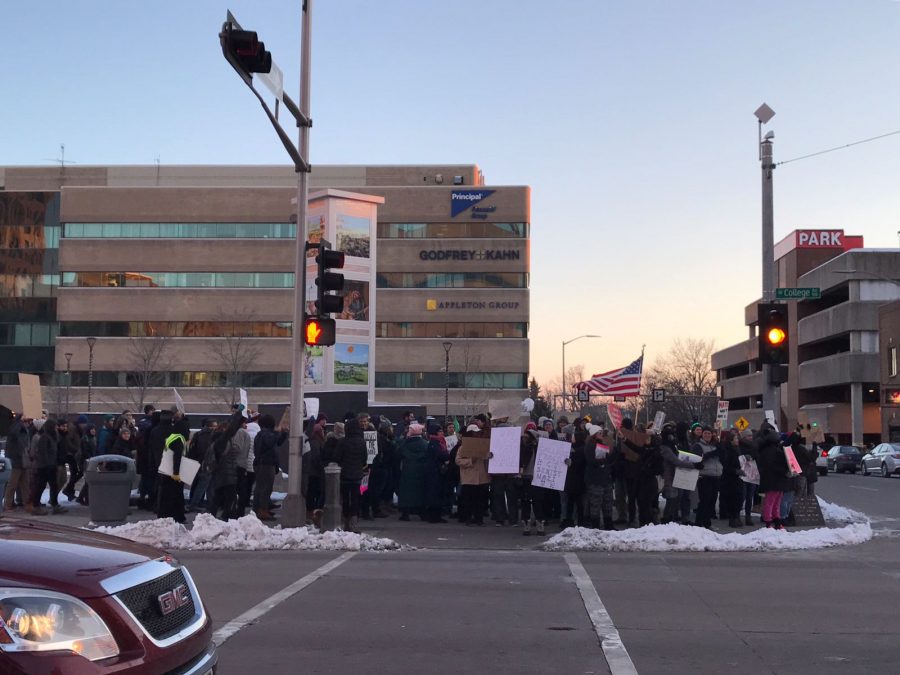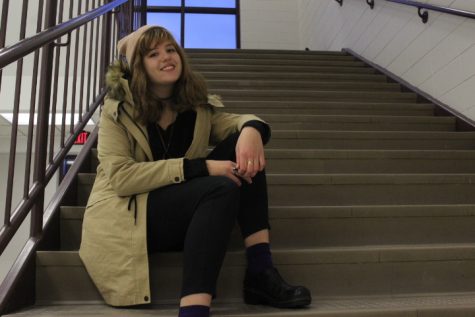Immigration protests spark conversation
March 23, 2017
Recently, in Houdini Plaza, a protest in opposition of Trump’s immigration signing took place, causing students in the community to stand up against these policies. These are interviews that took place on that day:
Rachel Geiger, Lawrence University Freshman:
What brings you out here tonight?
“I’m out here because I think it’s important to know there are people, in this primarily red state of Wisconsin, that think these issues are important, and that there are people out there who are backing up those affected by these issues.
“I went to the D.C. March, and I want to continue activism through grassroots movements, as those are very important to spark change in our society. For example, the Women’s March only started with a few women upset about an idea/policy, and they started something huge out of it. It’s also important to get involved, such as calling senators as these get people ready to do things outside of protests.”
Have you been affected by these policies or do you know someone who has been affected?
“One of my closest friends from back home, she was a green card holder, and when Trump’s immigration ban first was in order, even green-card holders were not allowed to come back. Which was difficult for her as she was considering visiting family outside of the country, but now couldn’t.”
Has this changed your perspective of the community?
“It made me recognize that there is a large community there for you, especially at Lawrence University. In our student population, we as a community came together, have large talks, open conversation and was a bonding point for many of us.”
Has it changed your perspective on other social and political groups?
“Not really, at least not from this. I’ve always had a fairly negative view on conservatives, this didn’t really change that. I feel like moderates need to step it up and make their perspectives on issues more clear, as it could highly influence the state of our own politics in this community and the countries, if they decide to fall on either side of the political spectrum.”
What is the difference between now and a year ago?
“I’ve definitely seen a difference, people are bringing activism up, people you wouldn’t expect to be politically involved are coming to protests and getting involved.”
Alejandra Alareon, Olivia Soule, Lawrence University:
How has this affected you personally?
“I was told I shouldn’t go home, as I was planning on visiting some family in Ecuador, and I shouldn’t because of Trump’s immigration ban.” – Alareon
“This hasn’t affected me personally, but I feel strongly about these issues, as the ban is unconstitutional, it’s just an excuse to ban Muslims, and countries that are considered to be dangerous. The whole idea that Islam is ‘awful’ is racist and horrible in and of itself”. – Soule
What is your relationship to the community and has it changed?
“I feel afraid, not safe anymore. It’s scary that people think that sexism, even rape is okay.” – Alareon
I don’t feel like I face any threat, but as a woman I’m disgusted in people who think what the president is doing is okay, and I fear for other women and people of the LGBT community. – Soule
What’s the difference between now and a year ago?
“I don’t think that hatred and bigotry is more prevalent, I feel like it’s not become more accepted and it’s the “norm now” as seen by Trump’s statements. It gives racists a reason to feel justified in their opinions.”
– Soule



